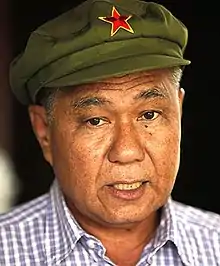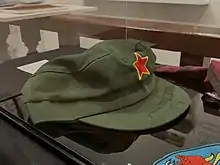Surachai Danwattananusorn
Surachai Danwattananusorn (Thai: สุรชัย ด่านวัฒนานุสรณ์; born 24 December 1942, disappeared 10 December 2018) is a Thai political activist and former political prisoner. He was the last communist to be pardoned in Thailand, and after his release he entered mainstream politics, becoming a committee member of the Thai Rak Thai Party and founding the Red Siam political movement. Surachai is known for his anti-monarchist views, which have resulted in a past arrest under Thailand's lèse majesté laws.
Surachai Danwattananusorn | |
|---|---|
สุรชัย ด่านวัฒนานุสรณ์ | |
 Surachai Danwattananusorn in 2010 | |
| Born | 24 December 1942 Pak Phanang, Nakhon Si Thammarat, Thailand |
| Disappeared | 10 December 2018 (aged 75) Vientiane, Laos |
| Status | Missing for 4 years, 10 months and 17 days |
| Alma mater | Sukhothai Thammathirat Open University (B.A.) |
| Political party | |
| Movement | Communist Party of Thailand |
Surachai has been in exile in neighbouring Laos since the Thai military coup of 2014.[1] He disappeared after the murder of two other anti-monarchist activists in December 2018.[2]
Political career

Surachai became well known after the Thammasat University massacre, as he was a prominent member of the Communist Party of Thailand. He was sentenced to death for murder and his participation in a train robbery but received a royal pardon in 1988.
After his release, Surachai entered mainstream politics, first as a member of the New Aspiration Party under the leadership of Chavalit Yongchaiyudh, and later as a Thai Rak Thai Party candidate for the House of Representatives. He also ran for the senate seat of Nakhon Si Thammarat, but was never elected to any office.
In 2006, Surachai participated in protests to oust the Council for National Security junta. Afterwards, he established the Red Siam political movement with Jakrapob Penkair.
On 6 August 2007, while on stage at a United Front for Democracy Against Dictatorship rally, Surachai allegedly insulted then-Prime Minister Chuan Leekpai. He was found guilty by a criminal court and was fined 50,000 baht, but the fine was later reduced by half after Surachai confessed to the crime.[3]
Surachai was arrested again on 22 February 2011, this time according to the arrest warrant of the Criminal Court 27/2554, for committing lèse majesté at a speech near Sanam Luang.[4] On 28 February 2012, The Criminal Court sentenced him to 7 years and 6 months in prison.[5] However, Surachai received a royal pardon on 3 October 2013.[6]
Personal life
Surachai Danwattananusorn was born Surachai Saedan (Thai: สุรชัย แซ่ด่าน; Chinese: 陳嘉前) on 24 December 1942 in Thaphaya Tumbol, Pak Phanang District, Nakhon Si Thammarat Province. He was the son of Yokyuan and Somchao Saedan. Surachai graduated with a Bachelor of Arts in political science from Sukhothai Thammathirat Open University. He has married three times, and has three sons and a daughter.
Disappearance
Surachai disappeared from Vientiane, Laos, in December 2018. His spouse last heard from him on 10 December.[1] Thai Prime Minister Gen. Prayut Chan-ocha visited Vientiane on December 13. Two of his aides, Chatchan "Phoo Chana" Boonphawal and Kraidet "Kasalong" Luelert,[7] also in exile in Vientiane, were last seen in Laos on 11 December before they too disappeared.[8]
On 26 and 27 December 2018, the bodies of the two aides were discovered floating in the Mekong River near Nakhon Phanom.[9][10][11] Reports of a third body being found have been denied by Thai authorities.[12][13] As of January 2019 Surachai remains missing.
Some in the Thai media see the forced disappearances and murders as a warning to anti-monarchists.[14]
Human Rights Watch has documented the disappearance of two other Thai activists in Laos, one in 2016 and another in 2017.[15][8][16] The number of "disappeared" Thai activists exiled in Laos may be as high as five since 2015.[17]
See also
References
- Rojanaphruk, Pravit (22 January 2019). "2nd Mutilated Body Linked to Anti-Monarchist Aide". Khaosod English. Retrieved 25 January 2019.
- Jintamas Saksornchai (25 February 2019). "Wife accuses Junta behind murder of missing republican activist". Khao Sod.
- "ศาลปรับ "สุรชัย แซ่ด่าน" 5หมื่น ฐานหมิ่น "ชวน หลีกภัย" | ประชาไท". Pratchatai. 10 July 2009. Retrieved 19 June 2017.
- (มหาชน), บริษัท ข่าวสด จำกัด, ในเครือบริษัท มติชน จำกัด. "ตำรวจรวบสุรชัย แซ่ด่าน คาบ้านพัก คดีหมิ่น". Khaosod Online (in Thai). Retrieved 19 June 2017.
{{cite web}}: CS1 maint: multiple names: authors list (link) - "จำคุก "สุรชัย แซ่ด่าน" หมิ่นเบื้องสูง 7 ปี 6 เดือน". Manager Online. Retrieved 19 June 2017.
- "สุรชัย แซ่ด่าน ได้รับพระราชทานอภัยโทษ -ออกคุกค่ำ". MThai News (in Thai). 3 October 2013. Retrieved 19 June 2017.
- Sopranzetti, Claudio (31 January 2019). "It's time we listened to the plight of Thai dissidents abroad" (Opinion). Al Jazeera. Retrieved 2 February 2019.
- Smith, Nicola (24 January 2019). "Gruesome Laos deaths of Thai activists sends chill through dissident community in exile". The Telegraph. Retrieved 25 January 2019.
- "Thai officials deny any role in the deaths of Surachai's aides". The Nation. 24 January 2019. Retrieved 25 January 2019.
- "Mutilated Thai bodies are activist's aides". BBC. 22 January 2019. Retrieved 25 January 2019.
- Robbins, Siobhan. "Concrete-filled bodies found in Thailand are aides of missing activist, police say". Sky News. Retrieved 25 January 2019.
- Saksornchai, Jintamas (23 January 2019). "Police Deny 3rd Corpse Was Found in Mekong". Khaosod English. Retrieved 25 January 2019.
- Rojanaphruk, Pravit (22 January 2019). "Photos Suggest Third Mekong Corpse Was Found, Then Lost". Khaosod English. Retrieved 25 January 2019.
- Rojanaphruk, Pravit (26 January 2019). "Opinion: Unmistakable Message to Thailand Surfaces in Mekong". Khaosod English. Retrieved 26 January 2019.
- "Laos: Investigate Disappearance of 3 Thai Dissidents". Prachatai English. 23 January 2019. Retrieved 26 January 2019.
- "Solve Mekong killings case" (Opinion). Bangkok Post. 25 January 2019. Retrieved 25 January 2019.
- Norman, Anne (30 January 2019). "What do Thailand and Saudi Arabia have in common?" (Opinion). Washington Post. Retrieved 2 February 2019.